Scott Adams's Blog, page 298
March 11, 2015
Is it Healthier to be Republican?
I am not a joiner. But if someone were to ask me which political party they should join, that answer is easy. You should be a Republican, for the health benefits.
As soon as you join a political group you give up any claim to credibility or independent thinking. Your impulse to agree with your side will be too strong for anyone else to imagine your opinions are well-considered. So your reputation and credibility will be terrible according to everyone on the opposite side plus the independents. No matter which side you join, about 60% of the public will think you are mentally defective. Let’s call that a tie for Republicans versus Democrats.
You probably want to join the party that is most often “right.” But you need not worry about that because once you join, it will seem as if everything your side does, or ever did, was right. That’s how humans are wired. So we can take “being right” out of the decision. And realistically, your one vote won’t change any policies anyway. You just want to feel good about your participation, and joining any party gives you that.
So on most dimensions, it does not matter if an individual joins the Republican or Democrat party. But there is one way that it makes a big difference: Stress.
If you become a Democrat, you have to worry about climate change annihilating humanity on your watch. If you are a Republican, climate change isn’t even a problem. Personally, I rest easier when I am not worried about a super-typhoon killing me during REM sleep.
Consider economics. If you are a Democrat, you have to balance all sorts of complicated economic theories in your head. That stuff is hard to understand and almost always wrong anyway. But if you are a Republican, all you need to know is that cutting taxes will make us all rich. Both approaches are ridiculous, but only one is easy. So take the easy, stress-free path. Then let the economy heal itself while the government is in gridlock, like always.
When it comes to bombing strangers in other countries, Democrats have to weigh all sorts of concerns about morality, national defense, relations with allies, economics, and likelihood of success. Republican have it easier here too. Regarding the Middle East, for example, all they have to do is ask themselves two questions:
1. What does Israel want us to do?
2. Do we have any bombs left?
I think you might say Democrats do the same thing. Fair enough. But if you are a Democrat you probably feel stressed about the decision because you must weigh so many factors. Republicans are barbecuing and thinking about football.
Democrats are always worried about issues of fairness and equal opportunity. For example, workplace gender issues are a huge deal for Democrats. But if you are Republican there is no problem there to fix, except for all the whining. And you can learn to ignore that too.
On other social issues, things are even easier for Republicans. All they need to do is wait to hear a Democrat propose an idea, then take the opposite side. This works every time because the Democratic Party likes to be proactive on social issues whereas conservative Republicans are more about small government and not changing what works so well (for white males). The fast-disagreer job is way easier than crafting legislation to reverse 300-thousand years of gender discrimination. So take the stress-free route.
When reading this, you might be tempted to think I identify with Democrats. I don’t. I am just amused at how easy the choice of parties is if you don’t like stress. Science tells us that stress is deadly. Some say stress is already an epidemic because it causes so many other health problems. So if you can reduce your stress, you come out way ahead.
Your irrational decision-making and your one vote won’t help the country no matter which party you join. But dying from stress is clearly bad. So if you want to be happy and healthy, join the Republican Party.
I doubt you can take the politics out of this discussion and focus on the question of health benefits. But please surprise me.
And no need to tell me that if “everyone took my advice” it would be a catastrophe. I don’t think we have to worry about people taking my advice.
Scott
You might also enjoy reading about a 3D printed “brick” that can cool your house. How awesome is that???
And this company is aiming to reduce poverty with an app that matches digital jobs with people who can work at home. Quite ambitious. I like it!
—————————————————————————————————————————
Dilbert on Facebook
@ScottAdamsSays (my dangerous tweets)
@Dilbert_Daily (Dilbert-related tweets)
My book on success: “I feel the best I have ever felt after reading a book.” - Puget Sound Paralegal (Amazon 5-star review Feb 20, 2015)
March 10, 2015
Robots Read News (Without Vulgarity!)
One of the most useful discoveries about my experimental comic Robots Read News was that my vulgar humor was not as popular as I had predicted and hoped. That makes sense, now that I think about it. Most adults would not share or re-tweet vulgarity even if they enjoyed consuming it. And in 2015, social media is the game. Any content that your core readers will not share might as well not exist. Oh, and the fact that it isn’t funny. That probably matters too.
But who cares about the fickle whims of the audience? Any self-respecting artist would defend his vision, vulgarity and all, because art is more important than commerce. Or so say all the people I totally don’t understand. So I decided to go a different direction. My plan is to give people what they want, if I can. I hope no one has a problem with that.
So here are two new RRN comics without vulgarity. Do they work?
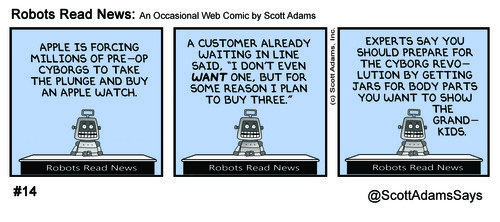
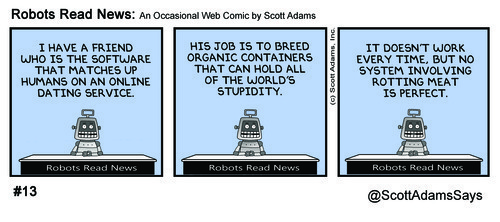
How amazing is it that I will probably have a persuasive result from this experiment in non-vulgarity in a few hours? All I have to do is watch the social metrics and my site traffic in real time. Are these tools, along with continuous testing and improvement, enough to develop a comic into something that people care about?
Beats me. You’ll find out when I do. I hope you enjoy watching a “system” operate as opposed to a goal. The test of the system is that I come out ahead even if the new comic fails. I hope I learn something.
[Quick unscientific update: The non-vulgar comics are a big hit on my Dilbert Facebook page today, and preferred to the vulgar ones, but things seem more split on Twitter and this blog. But Facebook is by far the biggest traffic driver this site… so…?
The other emerging pattern is that people like fewer words even if it means one joke instead of two.]
Scott Adams
Dilbert on Facebook
@ScottAdamsSays (my dangerous tweets)
@Dilbert_Daily (Dilbert-related tweets)
My book on success: “I feel the best I have ever felt after reading a book.” - Puget Sound Paralegal (Amazon 5-star review Feb 20, 2015)
March 9, 2015
People Who Don't Need People (Are the happiest people)
I saw a tidbit in a Business Insider story about a guy who had a positive emotional reaction to a computer-simulated woman he viewed with 3D goggles.
I was disgusted. The idea that software could be compared to the beauty and wonder of the human experience sent a shudder down my spine. Personally, I put a high value on the human spirit because that is what makes us special. Robots can never give me what I get from human relationships.
Well, one exception.
I assume a simulated human would be punctual, and I like punctuality. So we would get along great in that one, narrow way. But in general, I can not even imagine dating a soulless collection of ones and zeroes.
Although … I like the convenience of having a robot on call. They are never sick or distracted and they never go drinking with the other frustrated robots. I have a full schedule, and trying to coordinate with another busy human is like trying to lasso greased kittens. But all things considered, scheduling is a minor inconvenience when you consider the joy of human bonding and, dare I say, love.
But … now that I think about it … I suppose I would enjoy life more if my personal preferences always ruled the day. But hey, who says I’m always right about what I need? I might think I need a nap but what I really need is to hold shopping bags and watch someone text. You have to keep an open mind about things.
You are probably thinking that a robot would be programmed to always be upbeat, positive, cheerful, and optimistic. That sounds great on paper, but I would get tired of all that optimism. It wears you down. I prefer humans, flaws and all.
Speaking of flaws, humans tend to stop going to the gym as soon as they get into relationships. Sometimes they gain weight or cut their hair in a way that reminds you of Hitler’s many youth programs. But those are small, external issues. Love is about the person you are on the inside.
Speaking of my insides, I suppose a robot would never complain about my lack of romance, my inability to find things in plain sight, or my curious inability to do anything practical around the house. You might think I would enjoy a life with no complaining, but how can I improve unless someone makes me feel bad no matter what I do?
I think it goes without saying that a robot can never compete with a human woman when it comes to sex. Okay, realistically, the slacker-women in the bottom third of the skill curve are not ringing anyone’s bell. A robot woman would not need much game to land in the middle of that pack of underachievers.
Personally, I would never settle for a woman whose sexual skills were less than stellar. Why would I settle in any way? I want a woman who is so amazing that she would literally be insane to spend time with a guy like me. And if she did, I don’t know how I could respect her when she makes such bad decisions.
What I’m saying is that for anyone with a healthy ego, or even a dangerously inflated one such as mine, dating a robot is already the best choice. Who else would put up with me?
All I ask is that my future robot lover has an Apple logo on the back of its head so my unconditional love doesn’t feel awkward.
Scott
In other news, Lockheed says it is creating a fusion generator that could change the world. For example, I am imagining that fusion power might transform the Middle East from an important strategic asset for the Western world into a bunch of strangers killing themselves over disagreements about sand and magic. Go Lockheed!
Dilbert on Facebook
@ScottAdamsSays (my dangerous tweets)
@Dilbert_Daily (Dilbert-related tweets)
My book on success: “I feel the best I have ever felt after reading a book.” - Puget Sound Paralegal (Amazon 5-star review Feb 20, 2015)
March 6, 2015
Apple Watch
I am testing out some edgier material today just to see if a robot can get away with it.
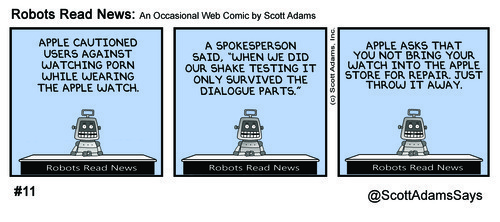
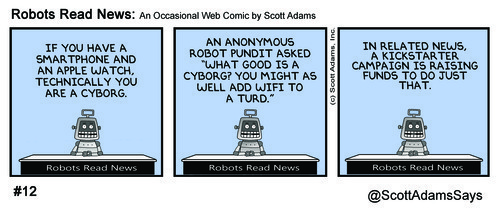
In other news, soon you will be able to print food with your 3D printer. And I thought my Vitamix blender was cool.
And how about putting a sticker on your arm that acts as a user interface for your phone? I want one.
And another…
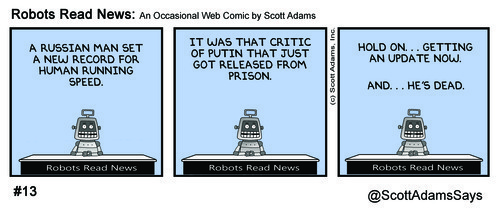
@scottadamssays
March 5, 2015
Try This Trick to Improve Focus
Are you having trouble focusing because the world is full of distractions? I have a brain trick that might help. I’ll get to that in a minute.
I have never been diagnosed with ADDHD. But I do have a massive problem with managing distractions. I have always had problems focusing on the uninteresting, but it feels as if the complexity of life in 2015 has tripled my problem.
To get a sense of the challenge, here’s what I did between 5-7 AM this morning.
- Wrote a Sunday comic about negotiating
- Wrote a Robots Read News comic
- Blogged about my co-writers, on three different topics
- Handled logistics for a speaking trip, one of several upcoming
- Solved two or three technical problems
- Studies up on RSS feeds and click-through rates
- Researched Tumblr to see if we lose traffic by hiding organic search
- Answered a continuous stream of email, text messages, and questions
- Read the comments on my blog
- Studied my site analytics looking for useful nuggets
- Worked through three other potential blog topics in my mind.
- Wrote this blog post while I was thinking of it (at around 9 AM)
And that is the START of my workday. I still have a movie script to tweak forward, a magazine cover photo-shoot to negotiate, check the unreleased app for my start-up (CalendarTree), prepare my argument for an upcoming political battle in California (which you will enjoy watching) and on and on.
Oh, and I invented a solution to a universal problem yesterday, and wire-framed it for an app. Today I will decide whether I should share it with my start-up team or wait until we release the new features already in the pipeline.
Now imagine all of that stuff in my head at the same time, along with my immediate bodily needs, plus my complicated social life.
Focus? I don’t even remember what it was like to have it.
So here’s my little trick when my mind is in fifty places and I need it to be in one place so I can accomplish a simple task right now:
I stare at my right hand.Then I command my hand to do the thing I need it to do, which usually involves touching a keyboard or my phone. If I need to stand up and walk to another room, I hold my hand in front of me and literally follow it to my destination, never losing focus. I also have to repeat the task, aloud, while following my hand, as in “Feed the cat. Feed the cat. Feed the cat.” Otherwise I end up in the garage fixing something that popped into my head on the way to the cat’s bowl.
When things get extra-bad, I add profanity and shouting to the mix to help me focus. That sounds more like “FEED THE F***ING CAT!…FEED THE F***ING CAT!…FEED THE F***ING CAT!”
The reason my trick works, at least for me, is that focusing on my hand gets me out of my head. And since my hand is moving, and somewhat interesting compared to inanimate objects, I can hold my attention on it for short periods. Sometimes I make fists, or wiggle my fingers to keep my focus.
There’s an interesting balance between creativity and distraction. To be creative, you want lots of random thoughts coming and going on their own schedule. Because of my career, my brain wiring has been optimized for high flow-through of ideas. Turning it off is a challenge.
I’m interested to see if my trick would work for you. If you have a chance to try it, please let me know in the comments. (Assuming you can focus long enough to do it.)
Another trick I use to regain focus is exercise. When my body is too tired to move, my brain is willing to endure a higher level of boredom. So I usually schedule exercise for around noon to reboot my focus for the afternoon. I assume my experience would translate to you as well, but I don’t know for sure.
Scott
———————————————————————————————————————
Other Interesting Things Today…
I predict that healthcare expenses will someday drop to 25% of their current level thanks to advances in medical devices. (I sometimes see the new stuff in beta when they pitch for funding, and WOW.) For example, check out a new digital stethoscope that promises to make a big difference.
Next, Is passion a key to success, or just another benefit of getting there? I know I get plenty excited when things work out for me. Vivian Giang helps us sort that out.
Next, would you order take-out food more often if you could watch the delivery guy’s progress on your app, like Uber? I know I would. The comfort of knowing exactly when your food is coming is a psychological game-changer. This start-up got that part right.
3D printing is getting scary. Now you can print at the molecule level and create mechanical sensors with no moving parts. I wonder if 3D printing will be the only way people acquire household goods in the future.
—————————————————————————————————————————
Dilbert on Facebook
@ScottAdamsSays (my dangerous tweets)
@Dilbert_Daily (Dilbert-related tweets)
My book on success: “I feel the best I have ever felt after reading a book.” - Puget Sound Paralegal (Amazon 5-star review Feb 20, 2015)
Robots Read News - Economic update
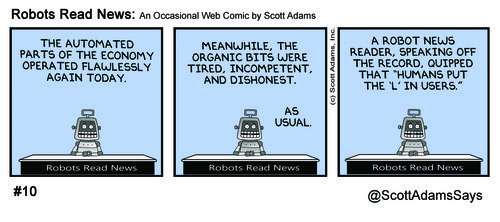
———————————————————————————————————————
Other Interesting Things Today…
I predict that healthcare expenses will someday drop to 25% of their current level thanks to advances in medical devices. (I sometimes see the new stuff in beta when they pitch for funding, and WOW.) For example, check out a new digital stethoscope that promises to make a big difference.
Next, Is passion a key to success, or just another benefit of getting there? I know I get plenty excited when things work out for me. Vivian Giang helps us sort that out.
Next, would you order take-out food more often if you could watch the delivery guy’s progress on your app, like Uber? I know I would. The comfort of knowing exactly when your food is coming is a psychological game-changer. This start-up got that part right.
3D printing is getting scary. Now you can print at the molecule level and create mechanical sensors with no moving parts. I wonder if 3D printing will be the only way people acquire household goods in the future.
—————————————————————————————————————————
Dilbert on Facebook
@ScottAdamsSays (my dangerous tweets)
@Dilbert_Daily (Dilbert-related tweets)
My book on success: “I feel the best I have ever felt after reading a book.” - Puget Sound Paralegal (Amazon 5-star review Feb 20, 2015)
March 4, 2015
Have You Ever Changed Your Mind? - By Diana Wales
———————————————————————————————————————
Foreward by Scott Adams
You probably know that people have been sending me topic suggestions for Dilbert for years. But you don’t know that one person has been my most prolific source: Diana Wales, my guest blogger for today.
Generating a novel topic idea for Dilbert is not easy. To put things in perspective, if a hundred readers send me one suggestion each, I might find a use for 5% of them. Diana’s hit rate per email was closer to 80%. That’s insane.
So I asked if she was interested in coming out of the shadow of anonymity and trying her hand at a blog post. Does her x-factor in idea-picking translate to prose? Can engineers write? Let’s find out.
By the way, her username on my old blog was Dilgal. I’ll let her decide after she sees your comments if she wants to reveal her new username on this site.
Humans are stubborn creatures. For most people, once they pick a side, their decision making is over - forever. Any evidence that might indicate that maybe there is a better option is ignored or derided, unless they perceive obvious and significant personal benefits for making a change. And even then they might hold fast. I used to live in Chicago, and I knew some Cubs fans that were more likely to change their gender than their allegiance to the Cubbies, despite a century of disappointment.
But once in a great while, we’re confronted with something that makes us change our perspective on even our most cherished beliefs. Sometimes it’s something subtle, like a person against medical marijuana use until they see granny’s chronic arthritis pain relieved when she blissfully scarfs down brownies. And sometimes it’s traumatic, like a dog owner that believes their dog’s breed is unjustly maligned, right up until it eats their face off.
For me, my religious beliefs changed when it occurred to me that the choice of one’s religion is almost entirely determined by what you were exposed to by your parents and community growing up. People very rarely thoroughly research multiple religions before choosing one, so it’s basically up to the luck of your birth. And if there’s one “right” religion and the others are wrong, then that implies that God sends billions of babies’ souls to be born into families and communities that will doom them. And for that to be true, it seemed to me that God would have to be a dick.
So today I still believe in God, I just think he values how we treat each other over how we pray, dress, wear our hair, or if we love bacon on our burgers. Of course I could be wrong, in which case I’ll have a lot of company in hell.
Scott regularly tosses out thought experiments to get people to look at things from another perspective. Has he ever changed your mind on anything? Or have you had some other epiphany that caused you to change your stance on a fundamental choice, like your political affiliations, religion, right to bear arms, or choice of smart phone, and if so, what was it? What does it take to change a mind?
—————————————————————————————————————————
—————————————————————————————————————————
Dilbert on Facebook
@ScottAdamsSays (my dangerous tweets)
@Dilbert_Daily (Dilbert-related tweets)
My book on success: “I feel the best I have ever felt after reading a book.” - Puget Sound Paralegal (Amazon 5-star review Feb 20, 2015)
March 3, 2015
Are You a Fiction-Thinker?
If every new idea you encounter reminds you of a movie, song, or novel that you have consumed in the past, it might be holding you back.
Movies and books form a mental structure in your head of what is possible and what is not. But these are artificial structures based on the rules of fiction. They do not necessarily represent what is practical or possible in the real world.
As you know, all people are irrational. We make decisions and then we rationalize them after the fact and create false memories of why we did what we did. (Science supports that statement, by the way.) Consumers of fiction are not unique in being irrational. But they do have more fictional stories in their subconscious to influence how they make decisions. And I have to think that biases a consumer of fiction toward strategies that worked out well in books and movies.
My hypothesis is that fiction-thinkers conflate fiction with reality more often than other people.I’m not a reader of fiction. For me, reading fiction is like being in a sensory deprivation chamber. Life isn’t happening for me when I am forced to read someone else’s brain drizzle in fiction form. (I consume lots of non-fiction because it is useful.)
The downside of avoiding fiction, in my case, is that I produce a lot of ideas that have already been explored by others and I am not aware of the similarities. Nearly everything I blog about generates email responses and comments saying some form of…
"Obviously you just finished reading the works of Gustov Blickelstein. Nice plagiarizing, cartoon-boy."
Our brains like to force things into familiar boxes. If you have the world’s greatest idea to feed the poor, but it reminds people of The Hunger Games, you can count on folks saying it won’t work. Our brains run to the nearest analogy and stick to it like glue. That might be a problem if the nearest analogy is based on fiction.
I would like to see a study of decision-making based on how much fiction one consumes. My hypothesis is that consumers of fiction will draw their “experience” in part from fiction and it will warp their understanding of what is practical or possible in the real world.
When I was a teen, adults started yapping about how our hippy music was warping our minds. We laughed at how stupid that was. But as an educated adult I can see that music rewires our brains, just as any other experience does. So listening to angry music should, according to everything we understand about human behavior and the brain, rewire a kid to be more like the people singing the songs. Influence of that sort only requires a combination of identification with the singer’s message, repetition, and emotion; Popular music provide that in abundance.
My hypothesis is that reading anything raises your intelligence in a variety of ways, as one might imagine. But I think exposure to fiction makes you less grounded in the real world (subconsciously) and more likely to make decisions the way the captain of the Enterprise would have done it, for example.
And I also think music is reprogramming the brains of kids in unpredictable and potentially dangerous ways. To believe otherwise is to believe that music is somehow the one thing in our environment that does not rewire us through repetition and emotion.
I think you all agree that our environment influences us in small ways all the time. Everything you see and learn rewires your brain. If you think fiction and music have only trivial impacts on us, you probably have a different frame of reference from me. As a trained hobbyist-hypnotist I have a unique impression of how easily we moist robots can be rewired. And as a cartoonist/blogger I see a huge volume of human reactions to what I produce; that’s how I noticed a fiction-thinking pattern, or so I think.
This isn’t an opinion piece. I’m just offering a hypothesis that fiction and music are reprogramming us to the point of influencing our happiness and our decisions. And we let that rewiring happen according to our cravings for entertainment, not our intelligence.
My guess is that on a scale from 1 to 10, you think this negative impact of fiction and music is closer to a 2, and not something to worry about in a free society. My vantage point on this topic is different from that of most of you, and my observation is that the problem is closer to an 8.
Personally, I stopped consuming angry, violent, or unhappy fiction long ago. My anecdotal observation is that it makes a gigantic difference in my mental state. But everyone is different.
My question of the day is whether you choose your fiction and music based on how it will rewire your mood and your mind, or do you select it based on its entertainment value. To put it another way, do you let your environment program you any way it wants, or do you try to manage that process?
Scott
@ScottAdamsSays
And check out the great topics my writing partners just posted.
Vivian Giang explores what comes first: Passion or Money?
Wireless earbuds use magnetic induction
Scan fingerprints through a barrier using ultrasonic waves
Photos of light acting as both a particle and a wave!
Start-up makes a Stethoscope that works over the Internet so you can play doctor at home.
—————————————————————————————————————————
My book on success: “…the best business book I have read in the last decade.” (Amazon 5-star review Feb 26, 2015)
March 2, 2015
The Effrindibulum Maneuver
Our bodies have too many parts. I can’t be expected to remember all of them. That’s why I created the word effrindibulum. Now when someone points to their ear and asks “What is the name of this part?” I can answer confidently that it is called the effrindibulum.
This word has many uses. If you injure yourself, and you don’t remember the name of the tendon or muscle involved, just say you pulled your effrindibulum and change the subject.
In order for this method to work for you, try saying out loud the word effrindibulum until you can say it with confidence the next time a discussion of body parts comes up. Try to be casual about it, this way.
Person 1: My cat scratched me on the … um…what is this?
You: That’s your effrindibulum. Looks like a bad scratch. Want to go to lunch?
You don’t want to linger on the topic. Just display your deep knowledge of anatomy and move on.
Let me know how it works out for you.
Scott
@ScottAdamsSays
————————————
See Tamra Teig’s Berkeley Start-up Review blog for the most interesting start-ups coming out of the Berkeley start-up ecosystem (second only to Stanford in number.)
And don’t miss Vivian Giang’s post on the dangers of smiling :-)
—————————————————————————————————————————
My book on success: “…the best business book I have read in the last decade.” (Amazon 5-star review Feb 26, 2015)
Robots Read News - about Russia
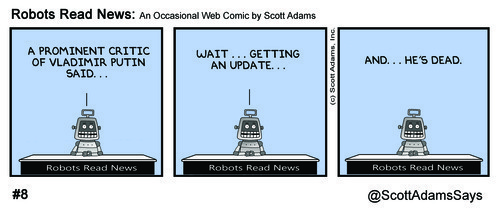
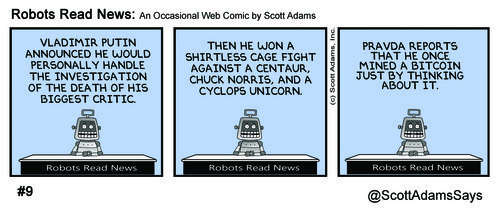
————————————————————————————————————————-
See Tamra Teig’s Berkeley Start-up Review blog for the most interesting start-ups coming out of the Berkeley start-up ecosystem (second only to Stanford in number.)
And don’t miss Vivian Giang’s post on the dangers of smiling :-)
—————————————————————————————————————————
My book on success: “…the best business book I have read in the last decade.” (Amazon 5-star review Feb 26, 2015)
Scott Adams's Blog
- Scott Adams's profile
- 1258 followers



